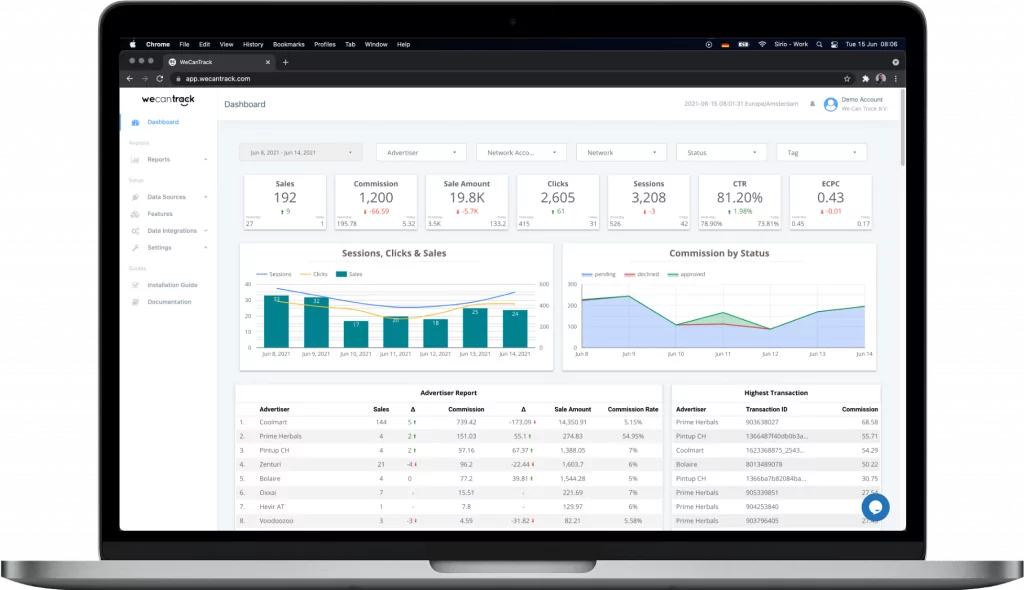Welcome to “Navigating Affiliate Traffic,” your essential guide to mastering traffic flow in affiliate marketing. This article is designed for new and experienced marketers looking to deepen their understanding and enhance their tactics for driving traffic to affiliate offers.
We will explore the vital concepts of organic traffic and delve into various affiliate traffic sources such as search engines, social media, and email marketing.
As we unravel the layers of affiliate marketing strategies, you will gain practical insights and techniques to channel traffic to your promotions effectively.
Our goal is to equip you with the tools you need to optimize your affiliate initiatives and ensure that your efforts translate into tangible profits.
Table of Contents
Unpacking Organic Traffic: Definitions And Foundations
Organic traffic is the lifeblood of affiliate sites, generated when a website appears in search engine results without paid promotion. This type of traffic is key because it attracts visitors actively searching for products or services related to what the affiliate site offers. The likelihood of clicks and potential purchases increases by appearing in relevant search results.
For affiliate marketers, mastering organic traffic means optimizing their website’s content, structure, and keywords to boost visibility on search engines. Techniques like search engine optimization (SEO), creating engaging content, and building links are essential.
Unlike paid traffic, which demands ongoing financial investment, organic traffic is free and tends to sustain itself over time. Users also view it as more trustworthy, enhancing the credibility of the affiliate site.
In essence, understanding and leveraging organic traffic can significantly enhance the effectiveness of affiliate marketing efforts, driving targeted visitors more likely to convert into customers.
Why Organic Traffic Matters For Affiliate Marketers
Organic traffic is crucial for affiliate marketers because it naturally brings visitors to their sites without needing paid advertising. These visitors are typically more engaged and interested in the content and products on the affiliate site, leading to better conversion rates.
The key benefit of organic traffic is its ability to draw in visitors actively searching for related topics or products. If an affiliate site ranks well in search results, it’s more likely to attract these relevant visitors. Since these individuals are already looking for specific information or products, they’re more inclined to explore the site and potentially make purchases.
SEO, or Search Engine Optimization, is the primary tool for generating organic traffic. It involves enhancing the website’s structure, content, and keywords to improve visibility and rankings on search engine results pages. SEO provides more sustainable growth and long-term benefits than other sources like social media or referrals.
In short, organic traffic is invaluable for affiliate marketers. It drives targeted visitors who are likely to convert and helps build a loyal customer base through meaningful interactions. Effective SEO strategies are essential in harnessing the full potential of organic traffic, thereby boosting online success.
Exploring Key Sources Of Affiliate Marketing Traffic
Affiliate marketers have a variety of traffic sources at their disposal to drive visitors to their offers. These range from organic strategies like search engine optimization (SEO), which enhances visibility on search engines through content optimization and backlinks, to direct engagement tactics such as paid advertising and email marketing.
Paid ads on platforms like Google AdWords and Facebook allow for targeted campaigns that can quickly generate traffic. Meanwhile, email marketing remains a powerful tool, enabling marketers to nurture leads with valuable content and special offers encourage clicks on affiliate links.
Social media platforms further extend an affiliate’s reach, offering a space to engage with audiences through resonated content or partnerships with influencers. Each channel has unique strengths, and a strategic approach can effectively increase traffic and potential earnings from affiliate campaigns.
Search Engines: Harnessing SEO For Better Visibility
Search engines are critical gateways in the digital age, guiding users to the information, products, and services they seek. Effective search engine optimization (SEO) can significantly enhance a website’s visibility, boosting traffic.
SEO involves refining a website’s content and structure to rank higher on search engine results pages (SERPs). Website owners can increase their discoverability by implementing robust SEO strategies such as keyword optimization, content creation, and backlink building. This not only attracts more visitors but also enhances the website’s authority and trustworthiness in the eyes of both users and search engines.
Social Media Platforms: Strategies For Engagement And Traffic
Social media platforms offer dynamic environments for engaging with users and driving traffic to your website. Each platform demands a specific approach to maximize engagement.
For example, Facebook benefits from regular updates, interactive posts, and community involvement through comments and groups. Being highly visual, Instagram requires high-quality photos and videos, complemented by engaging captions and strategic use of hashtags.
For businesses, leveraging these platforms means posting content and interacting with followers, using analytics to tailor content, and exploring advertising opportunities to reach a wider audience.
Email Marketing: Directing Focused Traffic To Offers
Email marketing remains a powerful tool for directly guiding traffic to affiliate offers and increasing conversions. Building a responsive email list is the first step, achieved through opt-in forms on your website and promotions across other channels.
Regular newsletters packed with valuable content establish your authority and keep subscribers engaged. Strategic placement of affiliate links within these emails can lead to higher click-through rates and conversions, provided the promotions are relevant and add value to the content. Consistency in sending out these emails helps maintain connection and interest among your audience.
Social Networks: Building Communities And Driving Traffic
Social networks are invaluable for building communities and enhancing a brand’s digital presence. Active participation on platforms like Facebook, Instagram, Twitter, and TikTok can foster community and loyalty among followers.
This involves more than just posting content; it requires engaging with comments, sharing insights, and participating in or starting conversations that resonate with your audience. Such engagement not only boosts your social proof, enhancing your brand’s credibility but also drives organic traffic to your site as followers become more invested in your brand.
Additionally, social networks offer extensive reach, allowing businesses to tap into diverse demographic groups and explore new market opportunities.

Building a successful website starts with passion for your niche. Research your audience's interests, create compelling content, and promote it through SEO, paid ads and social media. Engage with your audience regularly to foster a loyal following.
Leveraging Search Engines To Boost Affiliate Traffic
Leveraging search engines is a cornerstone strategy in digital marketing, particularly effective for boosting affiliate traffic. Search engines like Google and Bing are key in directing targeted visitors to affiliate offers.
By targeting specific keywords and phrases that potential customers use, affiliates can optimize their websites to appear in search engine results pages (SERPs). This strategic positioning connects them with people actively searching for the products or services they promote, enhancing their reach and impact.
The benefits of using search engines are significant. SEO techniques improve visibility and organic rankings, leading to more site visits and potential conversions. This approach allows for precise targeting, ensuring that the traffic is high in volume and relevance, increasing the likelihood of sales.
Furthermore, search engines offer valuable analytics that provide insights into user behavior, enabling affiliates to continuously refine their strategies and make informed decisions to boost their performance.
Amplifying Your Reach Via Social Media Platforms
Effectively amplifying your reach on social media platforms involves a blend of strategies tailored to engage and grow your audience.
Creating content that resonates with your followers is fundamental. This includes visually appealing images, informative posts, and interactive elements like polls or quizzes. Such content can boost engagement and encourage followers to share your posts.
Another effective strategy is to participate in Facebook groups relevant to your industry. By engaging in discussions and sharing your expertise, you can establish yourself as a thought leader and attract a broader audience.
Social media advertising is key to extending your reach. Platforms like Facebook and Instagram offer targeted ads that allow you to reach specific demographics, significantly enhancing your visibility and attracting an audience more likely to be interested in your offerings.
The benefits of a strong social media presence are manifold. It builds social proof and credibility, extends your market reach beyond geographic limits and helps develop customer loyalty through regular interaction.
Additionally, social media drives traffic to your website as you share links to your blog or homepage. It also serves as a critical tool for gathering feedback, enabling you to tune into your audience’s needs and improve your offerings.
Moving Forward
Affiliate traffic management is a decisive factor in every kind of affiliate marketing. Knowing more about the organic traffic, using SEO, and investigating the possibilities of social media and email marketing, affiliates turn their traffic into greater conversion. By developing the right combination of measures concerning the target market, the traffic is not only large but also effective.
Sure enough, as various digital environments develop, it is important to know more about traffic-related trends or tools. In terms of content, social media participation, and analytics, affiliate marketers can set up a long-term growth strategy and maximize the potential for growth in affiliate marketing.




